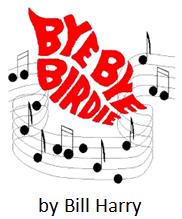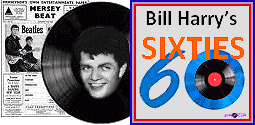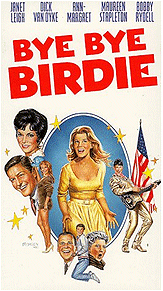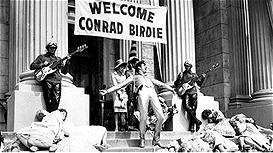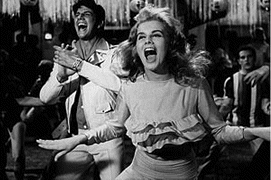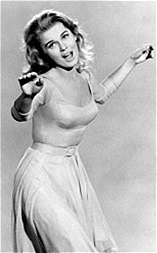As
Birdie is about to enter town, the female fan club members sing his
praises, the jealous boys the opposite. When Birdie arrives he sings
‘Honestly Sincere’ to the townspeople. The McAfee family sing ‘Hymn
For A Sunday Evening’ dressed in robes. In ‘One Boy’ Ann-Margret, as
Kim, sings to her jealous boyfriend to indicate that he is the only
one for her and Bobby Rydell, as Hugo, harmonises. ‘Put On A Happy Face’
is a cheerful song sung by Dick Van Dyke to Janet Leigh. ‘Kids’ is a
number sung by Paul Lynde, as Kim’s father, with support from Albert’s
mother, played by Maureen Stapleton. ‘One Last Kiss’ is the number penned
by Albert for Birdie to sing on the television show and we are shown
him rehearsing it. ‘Got A Lot Of Livin’ To Do’ is a bouncy, choreographed
dance number begun by Birdie and taken over by Kim and Hugo. When Birdie
sings ‘One Last Kiss’ on the show, Hugo appears and punches him. ‘Rosie’
is Albert’s love song to his fiancée, now approved of by his mother.
Kim ends the movie reprising ‘Bye Bye Birdie.
The book-ends of ‘Bye Bye Birdie’ were actually filmed six months after
the film had been completed and edited. The studio were happy with it
but George Sidney told them that he wanted to shoot more film of Ann-Margret
singing the title song for a new beginning and end for the movie. The
studio thought he was crazy but Sidney went ahead, putting down $60,000
of his own money to shoot her singing the opening and closing tune on
a treadmill with a wind machine blowing her hair. The studio reimbursed
him the money. A number of songs from the original stage musical were
excised from the film, including ‘An English Teacher’ (because Dick
Van Dyke’s profession was changed), ‘A Healthy American Boy’, ‘What
Did I Ever See In Him?’ and ‘Talk To Me.’ The name Conrad Birdie was
devised and used because Conrad Twitty was a rock and roll singer enjoying
a deal of popularity at the time.
|
|
